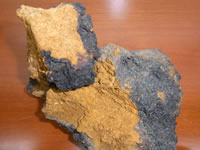Phaeoporus obliquus/Inonotus obliquus (Chaga mushroom)
Chaga, also called as “chagamushroom, and called “Inonotus obliquus" in Japan, is a kind of medical fungi, grown in birch trees, its fruit is block and black, mainly in north of Russia, Northern Europe, Japan(Hokkaido), infesting in north latitude of 40°~50° of Northern Hemisphere, the fungi have strong growing vitality, constantly absorb nutrients of birch, about 10 to 15 years later, the essence of birch could be completely absorbed and withered. This shows how strong the fungi are. The process of growth, absorbing nutrients and finally making trees withered,is similar as the process of human cells hyperplasia, gradually destroying healthy human cells and being dead finally, hence it comes the name of "cancer of birch". Mysterious Inonotus obliquus is widely known from the novel written by Solzhenitsyn Aleksandr Lsayevich who was the Nobel Prize winner for literature from former Soviet in 1970. There is such a description: the people from a Russian village have been boiling Inonotus obliquus tea, similar smell and color with coffee, so they never suffered from gastrointestinal problems and cancer. Hence Inonotus obliquus attracted widespread attention.
Russians think that: this is a magic gift to suffering mankind by god, used for prevention and treatment of liver cancer, AIDS and 157 colitoxin. Japanese researchers set a high value on Inonotus obliquus, and regard it as 'panacea'。
Ingredients of Inonotus obliquus
The main ingredients include more than 215 kinds such as polysaccharide, melanin, inonotus obliquus sterols, SOD and triterpenoids, it has effect on imbalance of hormones and immune system and could prevent from tumors growth. The Inonotus obliquus test results show that SOD (Super Oxide Dismutase) is 55 times than that of ganoderma lucidum, 23 times than that of Brazil mushrooms, 25 times of hericium, and water-soluble polysaccharide such as 1,3-1,6 β-dextran is up to 55.6mg/g.
Inonotus obliquus in Russia is used as a medical fungi and traditional Chinese medicine for treatment, and is regarded as health food in the 21st century, there is no toxic side effect based on long-term pharmacological research and clinical experiments, the effects are as follows:
Effect of Inonotus obliquus
1. Anti-cancer
Significant inhabitation on many tumor cells (mastocarcinoma, cheilocarinom,gastric cancer,subauricular gland,lung, skin, rectum cancer and Hawkins lymphoma). It could prevent cancer cell transfer and palindromia, improve immunity and physical condition. And it also can be applied in the partner treatment of radiotherapy and chemotherapy for the patients suffering from therioma, strengthening tolerance of patients and reducing toxic side effect.
2. Treatment for diabetes
Cure rate of Inonotus obliquus powder on diabetes of Russia Komsomlshi Pharmaceutical Company is up to 93%.
3. Anti-aging
Eliminate free radicals of body, protect cells, extend split algebra of continuous cell, promote cell longevity, stimulate metabolism, all these could effectively defer senility with long life after long-term administration
4. Effectively inhabit infectious virus and prevent cold
5. Prevent high blood pressure
It is reported that Inonotus obliquus is not only used as tonic, but also the cleanser for blood and alleviator for pains
6.Improvement and prevention of allergic cortex 7.Significant effects on hepatitis, gastritis, duodenal ulcer and nephritis, and also used to treat vomiting, diarrhea and gastrointestinal disorders.
